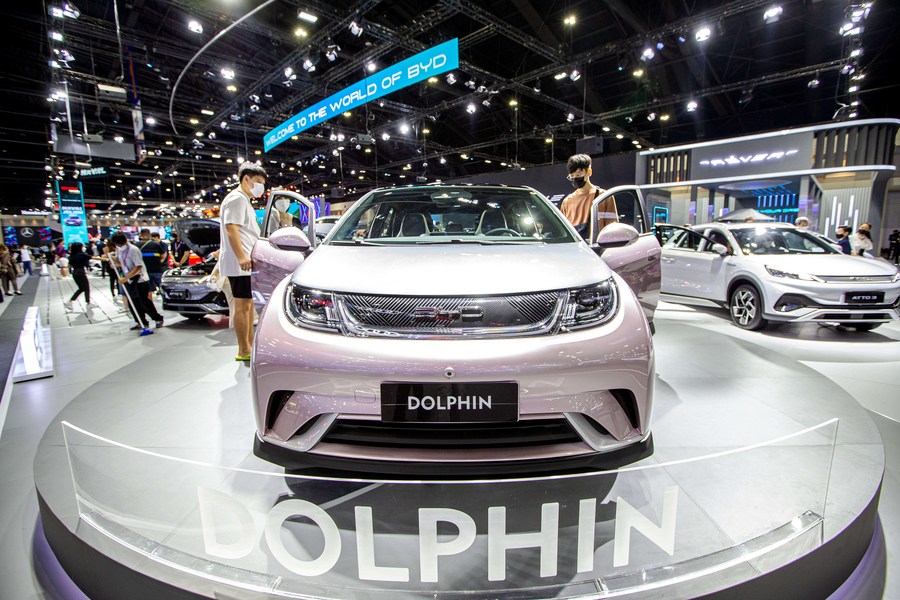
Visitors view a BYD Dolphin electric car during the Thailand International Motor Expo 2021 in Bangkok, Thailand, on Dec. 1, 2022.
by Chen Jiabao, Gao Bo
BYD secured the second spot with 2,627 orders so far in Thailand’s motor expo, while other established and emerging Chinese brands also showed their presence with significant sales.
BANGKOK, Dec. 9 (Xinhua) — Chinese electric vehicles (EVs) have been emerging as the sales volume front-runners among over 30 car brands exhibited at the 40th Thailand International Motor Expo which is wrapping up its 12-day run.
Led by Chinese brands, EV orders in the top 10 list have outpaced those of fuel-powered cars for the first time.
“It’s an unprecedented scene at the annual expo. Six from the top 10 list are Chinese electric brands, eclipsing the long-standing fuel-based brands. It’s an unexpected turn for Thailand’s automotive sector which has been dominated by Japanese fuel-powered cars,” “Kun Racing”, a noted Thai automotive YouTuber, commented in his review of the motor expo.
He highlighted the rising impact of Chinese EVs that is reshaping Thailand’s automotive industry and expanding the new energy vehicle market.
According to expo data, BYD secured the second spot with 2,627 orders from Nov. 29 to Dec. 5, trailing closely behind Toyota’s 3,031 orders. Established Chinese brands like SAIC’s MG and Great Wall Motors have maintained their sales edge. Newcomers including Neta, Changan and GAC Aion also achieved significant sales, forming a dominant presence alongside six major Chinese brands in the top 10.
Seven striking Chinese EV brands have stolen the spotlight at the Bangkok expo with diverse models. Exploring a green BYD ATTO 3, 33-year-old visitor Pawat expressed interest in switching to Chinese EVs due to their variety and cost-effectiveness amid rising fuel prices.
“Chinese electric cars offer diverse styles, high efficiency and exceptional battery life. They’re a practical, cost-saving choice,” said Pawat, who is looking forward to more Chinese EVs in Thailand.
Like Pawat, many Thai consumers have become fans of Chinese EVs. “After using Chinese electric cars, it seems like we never want to go back to fuel cars”, a netizen said in reviews of the motor show. Some cheered for Chinese electric cars, citing an irresistible combination of environmental-friendliness and superior driving experiences.
Ke Yubin, general manager of BYD Thailand, told Xinhua that this year’s motor show witnessed an increased presence of Chinese brands that provide Thai consumers with diverse choices through excellent products at affordable prices. He said this year marks a surge in Thailand’s EV market growth.
“With thorough testings in the domestic market, we are bringing our rich technical expertise and stable products overseas. Next year BYD will commence production in Thailand, accompanied by a dedicated research and development team to develop products tailored for the Thai market,” he said.
“To enhance service quality, we plan to increase 4S stores offering after-sales services and spare parts across Thailand.”
Data from Auto Life, a leading Thai automotive media outlet, shows the sales volume of battery electric vehicle (BEV) in Thailand surged by 497 percent to reach 58,074 units in the first 10 months of this year, with Chinese brands commanding over 80 percent of the new market.
Kasikorn research center, a Thai think tank, anticipates that the sales volume of BEV could surpass 68,000 units by the end of 2023, increasing the market share from 1 percent in 2022 to 8.6 percent, and projecting it to rise to 10-12 percent in 2024 in the overall automobile market.
Kriengsak, director of the Thai Automotive Research Institute, noted the surge in Chinese EVs has bolstered the allure of electric cars and fostered the development of an EV industrial chain in Thailand, positioning the Southeast Asian kingdom as ASEAN’s leading new energy vehicle market.
Apart from product enhancements and market expansion, Chinese EV companies aim to boost Thai technical expertise in the field.
Bao Zhuangfei, general manager of Neta Thailand, told Xinhua that Neta is initiating collaboration with the Thai Ministry of Education. The Chinese electric carmaker provides training to Thai technical school teachers in after-sales and electrical technologies.
Zhang Zhen, brand manager of the ASEAN region for Great Wall Motors, said the company plans to introduce new energy pickup trucks to Thailand next year.
“While Thailand’s electric vehicle sales growth is promising, it’s still in its nascent stage compared to fuel-powered cars,” said Zhang. He anticipates more Chinese brands joining forces to expand Thailand’s new energy market, offering an enhanced exposure of Chinese EVs to a wider consumer base.■
This article was originally published by a english.news.cn . Read the Original article here. .

